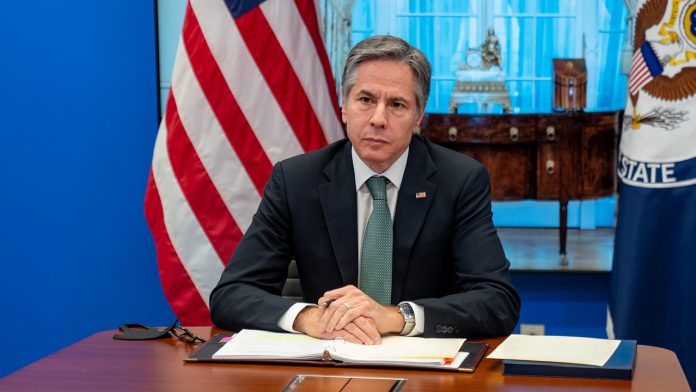U.S. Secretary of State Antony Blinken concluded his visit to Jerusalem and the West Bank on Tuesday, with little progress made in de-escalating the Israeli-Palestinian tensions, experts said.
Blinken’s trip, during which he met with leaders of Israel’s new right-wing government and the Palestinian Authority (PA), came amid escalating violence between Israelis and the Palestinians.
Since the start of 2023, Israeli forces have killed at least 35 Palestinians, making January one of the most deadly months in the West Bank in recent years. Most casualties occurred during Israeli military raids, which Israel says aimed to detain Palestinian militants.
In retaliation, a shooting attack launched by a Palestinian gunman outside a synagogue in an Israeli settlement in East Jerusalem claimed the lives of seven people on Friday night.
On Monday, Blinken held talks with Israeli Prime Minister Benjamin Netanyahu in Jerusalem and other senior officials before traveling on Tuesday to the West Bank city of Ramallah to meet Palestinian President Mahmoud Abbas.
In both places, Blinken urged de-escalating the tensions and renewed the call for a two-state solution to the conflict. “The rising tide of violence has resulted in the loss of many innocent lives on both sides,” he told reporters in Jerusalem. “All sides must take steps to prevent further escalation of violence.”
LITTLE PROGRESS ACHIEVED
The top U.S. diplomat’s trip failed to offer any new initiative to solve the Israeli-Palestinian conflict, Michael Milshtein, an expert from the Moshe Dayan Center for Middle Eastern and African Studies at the Tel Aviv University, told Xinhua.
Milshtein said the Israeli government was hopeful that Blinken will exert pressure on Abbas to renew the security coordination between the PA and Israel. The PA decided on Jan. 26 to end security coordination with Israel in response to an Israeli military raid in the West Bank city of Jenin, in which Israeli forces killed ten Palestinians.
The security coordination, which is criticized by many Palestinians, has led to the arrests of some Palestinians who were allegedly planning attacks against Israelis.
In a statement issued after meeting with Blinken, Abbas made no indication he was going to resume the coordination. He accused Israel of violating Palestinians’ rights, promoting annexation of the West Bank, and demolishing Palestinian homes — moves that pose further hurdles to achieving a peace deal.
“We have found that the Israeli government is responsible for what’s happening these days,” Abbas said.
Assaf Meydani, a professor at the Lauder School of Government, Diplomacy and Strategy of the Reichman University in Herzliya, told Xinhua that “negotiations between Israel and the Palestinian Authority in the current situation is impossible, even the United States knows it.”
On the other hand, Blinken’s visit also had limited impact on the Israeli side, which has a new hawkish government that is unlikely to dial down its position against the Palestinians.
“The situation inside Israel makes the current government go to more ‘extreme’ to ensure its survival for the longest possible period, and therefore it will continue to escalate, and in return, there will be a Palestinian reaction,” said Ghassan al-Khatib, a political science professor at the Birzeit University in the West Bank city of Ramallah.
The visit, which marked the first meeting between Blinken and Netanyahu since the latter returned to office in December as the leader of a new right-wing government, was seen as part of Washington’s efforts to navigate through the differences between the Biden administration and the new Israeli government.
His trip followed the visits to Jerusalem by Biden’s National Security Advisor Jake Sullivan and CIA Director William Burns earlier in January.
U.S. ATTENTION OCCUPIED ELSEWHERE
Al-Khatib also noted that the Palestinian-Israeli conflict is not a priority for the U.S. as its attention is occupied by “other internal and external issues.”
The Palestinians have repeatedly called on Washington, as Blinken promised in 2021, to reopen the U.S. consulate for Palestinians in Jerusalem and the PLO office in Washington. They also urged the U.S. to pressure Israel to preserve the status quo in Jerusalem and stop Israeli unilateral measures or withholding Palestinian tax revenue dues.
But the U.S. administration led by President Joe Biden has remained largely acquiescent regarding the escalation of Israeli violence in the West Bank and East Jerusalem, while failing to fulfill any of its promises made either during the election campaign or in bilateral meetings with Palestinian officials, analysts noted.
Milshtein said that the U.S. does not prioritize the Palestinian issues anymore, adding the attention of Washington is occupied elsewhere, mainly its internal issues as well as the Ukrainian crisis.
Ziyad Abu Ziyad, a think-tanker and former Palestinian minister, said that the U.S. is not interested in ending the Israeli occupation or the conflicts in the region despite its talk of a two-state solution and positive steps to solve the Palestinian issue.
He added that it’s time for anyone who bets on a U.S. solution to the Palestinian issue to “realize that this was nothing but a mirage.”
The last round of Israeli-Palestinian peace talks ended without progress due to deep differences on several key issues in March 2014, since which Washington has made no real push to renew the stalled peace process despite the recurrent violence and conflicts between the Israelis and Palestinians.
Source: Xinhua Editor: huaxia



